CHAKOTHI, Pakistan: Muhammad Latif never thought he would be washing buses for a living, but he took the job three years ago after shutting down the watermill that had been in his family for six decades.
Years of drought and erratic rains have devastated crops in his village of Chakothi, on the border of Pakistan-administered Kashmir, leaving locals with no grain to grind and no business for his mill, he said.
“When people stopped coming for grinding, I locked it up and started washing buses to buy bread for my family,” Latif, 50, told the Thomson Reuters Foundation, pointing at his deserted mill. “I am left with no option.”
Latif is among hundreds of millers who have had to abandon their trade as changing rain patterns shrink crop yields across the disputed Himalayan region, agricultural experts said.
Zahid Ahmed, business development officer with Pakistan’s National Rural Support Programme, estimated the region has more than 2,000 watermills.
But most have had to shut as harvests declined by 40 percent over the past decade, with only about 250 still functioning, he said.
Last year, incessant rains close to harvesting time caused huge crop losses all over Kashmir, said Murtaza Gillani, deputy director at the agriculture department for Jhelum valley, where Latif’s village is situated.’
“A farmer becomes dejected when his crop is lost near reaping, which forces him to switch to other jobs,” Gillani said, adding he once watched a farmer set fire to his entire field of failed crops in despair.
WHEAT PREFERENCE
Pakistan ranked fifth in last year’s Global Climate Risk Index published by environmental think-tank Germanwatch, which looks at countries suffering most from extreme weather events.
Those impacts, made worse by climate change, have had a knock-on effect on the hundreds of watermills, known locally as jandar, that were built decades ago along the brooks and streams of Kashmir, mainly for grinding wheat and maize, or corn.
Choudhary Muhammad Kareem, a farmer from Khaigaran village near Chakothi, remembers when there were a dozen watermills working along the brook near his farm — now only two are left.
Along with changing rain patterns, said Kareem, 65, shifting food habits are also putting a strain on watermills, with many young Kashmiris preferring wheat over corn.
As growing numbers of farmers swap from the hardy corn variety used in the region to wheat to meet demand, they lose more of their crops in dry spells or heavy rains, and watermills see less business, Kareem explained.
For farmers who are still managing decent yields, watermill closures force them to spend added time and expense to get their grain ground into flour.
“It costs me 2,000 Pakistani rupees ($13) if I rent a car to take wheat or maize for milling to the nearest town, which is 8 kilometers (5 miles) away from Chakothi,” Kareem said.
WATER SCARCITY
Agriculture experts estimate about 80 percent of farmland in Azad Kashmir Kashmir depends on rain for irrigation, but water shortages across Pakistan mean even those using irrigation systems often find their crops going thirsty.
Zaheer Gardezi, a water harvesting expert and former director of the national government’s rainwater harvesting project, said 70 years ago Pakistan’s annual per capita water availability topped 12,000 cubic meters.
Today, it has dropped to about 900 cubic meters per person per year, he said.
The United Nations defines a country as water stressed if annual availability falls below 1,700 cubic meters per person, and water scarce if it reaches 1,000 cubic meters.
With Kashmiri farmers struggling to grow enough to earn an income and feed their families, 3 million people are currently getting subsidised flour through a government program, said Sardar Amanullah Khan, director of the Kashmir food department.
Demand for subsidised flour — which is ground at industrial, electrically powered mills — jumped 30 percent after last year’s heavy rains, he added.
NEW MILL USES
The vicious cycle of extreme weather and ruined crops has put a strain on Kashmir’s watermills for years, said Muhammad Naeem Ahmed, director of the Office of Research, Innovation and Commercialization at the University of Azad Jammu and Kashmir and a farmer himself.
“Watermills are environmentally friendly and they are disappearing fast as frequent erratic rains and droughts are impacting farmers,” Ahmed said.
He suggested authorities look for new ways to adapt the mills to generate income, pointing to electricity generation and sawing logs for timber as examples.
Farmers also need to take adaptive measures, such as sowing hybrid crop varieties that can stand up better to severe weather, he said.
Muhammad Bashir Butt, secretary of Kashmir’s agriculture department, said the government is developing new climate-resilient seed varieties, as well as educating farmers on the benefits of adjusting planting times.
It is also reconstructing irrigation channels damaged by landslides, floods and the disastrous earthquake that struck the region in 2005, he said, noting the project could both benefit farmers and help revive shuttered mills.
Watermills could be set up over the canals and run on the water flowing through them, Butt told the Thomson Reuters Foundation.
But Latif, the mill owner in Chakothi, said even with a more reliable source of running water, he would still need government assistance to restore his mill after closing it for so long.
Made out of mud, wood and stone, the watermills start to fall apart without regular use and maintenance, he explained.
“I can restore this (mill) if the government or an NGO provides me with 50٫000 rupees,” he said.
“I do hope I will be able to restore my watermill soon, so I can try to save some money to buy food for my family.”
Watermills grind to a halt as erratic weather hits Kashmir grains
https://arab.news/vymw7
Watermills grind to a halt as erratic weather hits Kashmir grains
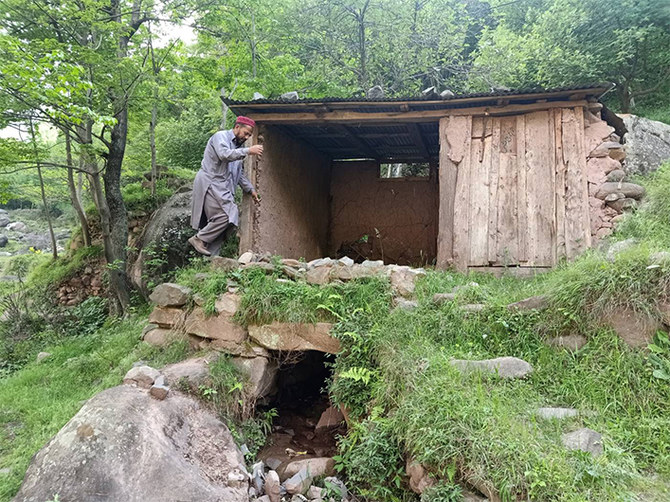
- Region has over 2,000 watermills, most have had to shut as harvests declined by 40% over past decade
- Shifting food habits are also affected watermills, with many young Kashmiris preferring wheat over corn
Elephant Madhubala to be shifted to Karachi’s Safari Park in May— state media
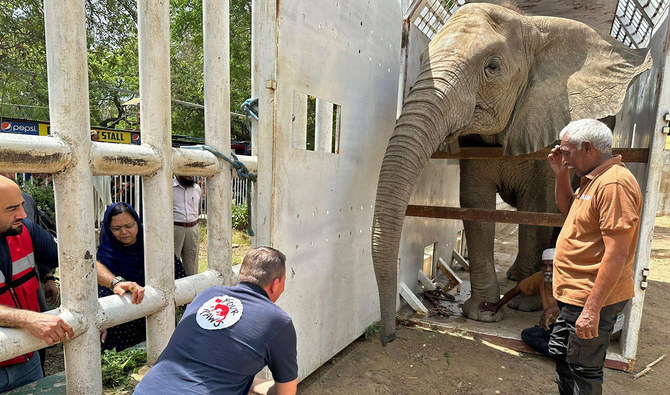
- Madhubala has been in solitary confinement since April 2023 when her companion, elephant Noor Jehan, died
- International animal rights organization warns solitary confinement has taken a toll on Madhubala’s mental health
ISLAMABAD: Pakistani elephant Madhubala, who has been in solitary confinement at Karachi Zoo since last year, will be shifted to Karachi’s Safari Park in May where she will be in the company of two other elephants, state-run media Associated Press of Pakistan reported on Thursday.
Madhubala, one of only three captive elephants alive in Pakistan, was brought to the South Asian country with three other elephants from Tanzania in 2009. However, has been in solitary confinement at Karachi Zoo since April 2023 after her companion, elephant Noor Jehan passed away from illness.
International animal rights organization FOUR PAWS, which has been involved in efforts to have Madhubala relocated to Karachi Safari Park, said last week the solitary confinement has taken a strong toll on her mental condition, with boredom being her biggest stressor.
Animal rights activists have long campaigned against the plight of animals in Pakistan, especially elephants, and demanded they be shifted to “species-appropriate” locations such as the Safari Park.
“According to Zoo administration, the arrangements for the transfer have been completed,” APP said. “Madhubala will join two other elephants, Sonia and Malika after relocation to Safari Park.”
A FOUR PAWS spokesperson said the organization was thrilled to see Madhubala finally getting the treatment she deserves.
“Her story is a testament to the power of collaboration and the importance of animal welfare,” the spokesperson was quoted as saying by APP.
FOUR PAWS says the elephant enclosures at Safari Park would have water elements for bathing, skincare and thermoregulation. Enrichments such as hay nets, varying substrates like soil, sand, clay, and sawdust will be provided for Madhubala to dust bathe while the area is secured by elephant-proof fencing.
Madhubala will be carried from the Karachi Zoo to the Safari Park in a huge transport crate. The elephant is currently being trained to enter and exit the crate by herself and sit inside it.
‘Politically motivated’: Pakistan rejects US State Department report on rights abuses
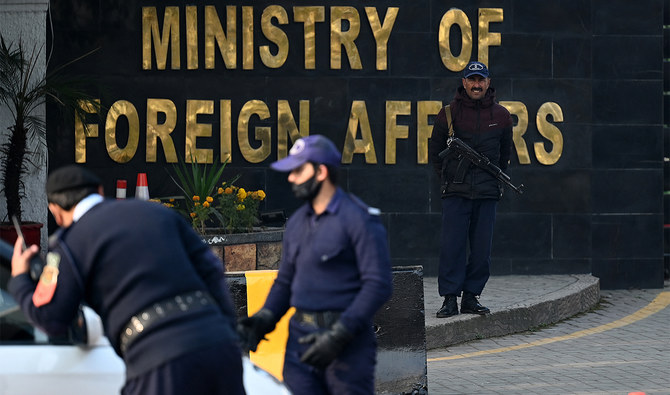
- Annual assessment identified arbitrary detentions, extrajudicial killings, enforced disappearances
- Pakistan government and state agencies deny involvement in missing persons cases, other rights abuses
ISLAMABAD: Pakistan said on Thursday it “categorically” rejected the 2023 country report on human rights practices issued by the US State Department, saying the report was politically motivated, lacking in objective evidence and followed an agenda of “politicization of international human rights.”
The annual human rights assessment released earlier this week identified arbitrary killings, extrajudicial killings, enforced disappearance, torture and “cases of cruel, inhuman, or degrading treatment or punishment by the government or its agents” in Pakistan last year.
The report also said the government “rarely took credible steps” to identify and punish officials who may have committed rights abuses.
“The contents of the report are unfair, based on inaccurate information and are completely divorced from the ground reality,” the Pakistani foreign office said in a statement, adding that the assessment used a “domestic social lens to judge human rights in other countries in a politically biased manner.”
“This year’s report is once again conspicuous by its lack of objectivity and politicization of the international human rights agenda. It clearly demonstrates double standards thus undermining the international human rights discourse.”
The foreign office said it was “deeply concerning” that a report purported to highlight human rights issues around the world was ignoring or downplaying the “most urgent hotspots of gross human rights violations” like Gaza and Kashmir. It also called on the US demonstrate the “requisite moral courage” to speak the truth about all situations and play a constructive role in supporting international efforts to end human rights violations.
“In line with its constitutional framework and democratic ethos, Pakistan remains steadfast in its commitment to strengthen its own human rights framework, constructively engage to promote international human rights agenda, and uphold fairness and objectivity in the international human rights discourse,” the FO added.
Political leaders, rights groups and families of victims have long accused the government, the army and intelligence agencies of being behind cases of arbitrary detentions, extrajudicial killings and enforced disappearances, among other rights abuses. Families say people picked up by security forces on the pretext of fighting militancy or crime often disappear for years, and are sometimes found dead, with no official explanation. Pakistani state agencies deny involvement in such cases.
On Tuesday, Pakistan’s law minister said the government would reconstitute a committee to address enforced disappearances, hours after the release of the US report.
“Now the work is being initiated on this again on the directives of the prime minister. A committee is going to be reconstituted, there will be parliamentary presence in that committee,” Law Minister Azam Nazeer Tarar said.
“There is no lack of seriousness on the government’s part to resolve this issue.”
Pakistani court bars ex-PM Khan, wife from issuing statements against state institutions
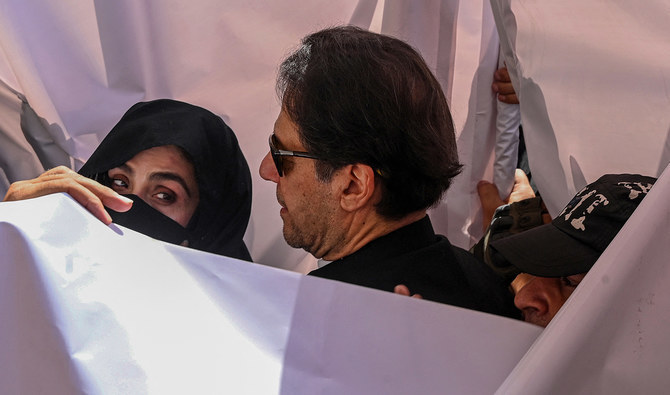
- Accountability court directs media personnel to confine reporting to proceedings of the trial only
- Khan widely believed to have fell out with army, leading to ouster from PM office in 2022
ISLAMABAD: A Pakistani accountability court judge recently barred former prime minister Imran Khan and his wife, Bushra Bibi, from issuing “derogatory” or “inflammatory” statements against state institutions and their officials.
Khan, who was PM from 2018-2022, remains jailed in multiple cases, including a 14-year jail sentence for him and his wife for the illegal sale of state gifts. Khan was first imprisoned after being handed a three-year prison sentence in August 2023 by the Election Commission for not declaring assets earned from selling gifts worth more than 140 million rupees ($501,000) in state possession and received during his premiership. In January, Khan and wife Bushra Bibi were handed 14-year jail terms following a separate investigation by the country’s top anti-graft body into the same charges involving state gifts.
Khan blames Pakistan’s powerful military, which has ruled the country directly for over 30 years, for colluding with his rivals to remove him from office via a parliamentary vote in April 2022 and subsequently cracking down on his supporters. The military denies his accusations and has repeatedly said it does not interfere in political matters.
On Friday, accountability court judge Nasir Javed Rana heard Khan’s petition requesting a fair trial. The PTI founder had sought the removal of glass and wooden structures erected at the Central Prison in Rawalpindi, where an appeal against his conviction is being heard. He had also alleged that reporters were not being allowed to attend proceedings, saying that the actions violated the principles of an open trial ordered by the court.
“The accused persons shall refrain from making any political, inflammatory and/or derogatory statements vis-a-vis state institutions and the officials insinuating anything to them,” a copy of the order, seen by Arab News that emerged on Thursday, read.
“The media personnel shall confine their reporting to the proceedings of the trial and shall not publish/report any statements in the trial proceedings, as witness or as counsel,” it added.
Khan’s convictions mean he is banned from holding public office and ruled the 71-year-old out of general elections earlier this year. Arguably Pakistan’s most popular politician, Khan says all cases against him are motivated to keep him out of politics.
Tensions between Khan and the military escalated in May 2023, when angry supporters of his party took to the streets in response to his brief detention, and torched government buildings and ransacked military installations in many parts of the country.
The army cracked down on Khan’s supporters and leaders following the attacks. Khan denied he had incited his supporters to protest violently, saying he was in detention when they erupted.
Pakistan eye comeback against New Zealand in fourth T20I today

- A second-string New Zealand squad beat Pakistan by seven wickets on Sunday in Rawalpindi
- Skipper Babar Azam says pacers Shaheen Shah Afridi, Naseem Shah have ability to make comeback
ISLAMABAD: Pakistan will be eyeing a comeback today, Thursday, in the fourth match of the T20I series against New Zealand in Lahore after suffering a defeat at the hands of a second-string Kiwi squad last week.
Pakistan will head into today’s match against Michael Bracewell’s squad without star batter and wicketkeeper Muhammad Rizwan, who has been pulled from the series after he felt discomfort in his right hamstring.
New Zealand are missing key players including Trent Boult and skipper Kane Williamson as they opted to play in the lucrative Indian Premier League (IPL) while pulled out of the Pakistan series due to injuries.
Despite that, the Kiwis managed to beat Pakistan on Sunday by seven wickets in Rawalpindi, shocking the 2009 T20I world champions on their own turf.
“We did not lose because of any two or three players,” Pakistan captain Babar Azam said at a press conference in Lahore on Wednesday night. “We lost as a team. In the batting, bowling and fielding [areas] we did collapse a little.”
Pakistan’s premium fast bowlers Naseem Shah and Shaheen Shah Afridi failed to impress against New Zealand in the third T20I. However, Azam backed both bowlers, describing them as Pakistan’s “best” bowlers.
“They know how to make a comeback, even if it [bad performance] happens in one game. It is part of life,” he said. “It can’t happen that one person performs every single day.”
The series is an important one for both sides as they gear up for the ICC T20 World Cup 2024 in the West Indies and USA scheduled to be held in June.
The last match of the Pakistan-New Zealand series will be played in Lahore on May 27. Pakistan and New Zealand have both won one match against each other so far, with the first T20I fixture washed away by rain.
The match begins at 7:30 p.m. Pakistan Standard Time.
Pakistan suffered more from Afghan ‘imbroglio’ than wars with India — special envoy to Kabul
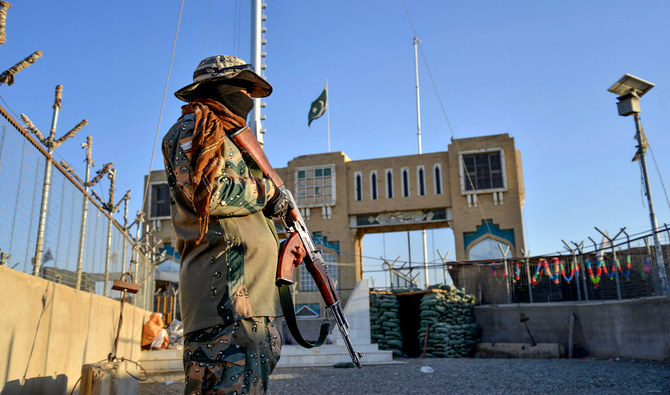
- Ambassador Durrani hopes Pakistan will overcome security threats from Afghanistan through diplomacy
- He warns of growing hostilities in the Middle East, saying the Iran-Israel conflict can engulf the region
ISLAMABAD: Pakistan’s Special Representative for Afghanistan Ambassador Asif Durrani acknowledged that his country had suffered a great deal more due to the volatility in its northwestern neighborhood than its recurrent wars in the east with nuclear-armed India while addressing a conference on Wednesday.
Durrani issued the statement during a penal discussion at the Institute of Strategic Studies Islamabad while sharing a broad overview of his country’s threat perception. Pakistan blamed the administration in Kabul last year in November for not doing enough to address its security concerns by clamping down on militants operating from Afghanistan.
It even maintained there was enough evidence that Afghan authorities were “facilitating” attacks launched by the Tehreek-e-Taliban Pakistan (TTP) against its people and security forces. Subsequently, Pakistan started deporting “illegal immigrants,” mostly Afghans, from its cities while citing security reasons.
“Afghanistan has become a permanent fixture in Pakistan’s regional paradigm for over four decades,” Durrani told the gathering. “In terms of blood and treasure, Pakistan has suffered more due to the Afghan imbroglio than its three wars with India.”
“Over 80,000 Pakistanis have died in the past two decades during the so-called war on terror,” he continued. “The country is still counting its dead and injured. After the withdrawal of the NATO forces, it was hoped that peace in Afghanistan would bring peace in the region. However, such expectations were short-lived.”
Durrani maintained that TTP attacked had increased by 65 percent after the departure of international forces while suicide bombings had shot up by 500 percent.
“The TTP’s enhanced attacks on Pakistan while using Afghan soil have been a serious concern for Pakistan,” he said. “Another worrying aspect is the participation of Afghan nationals in these attacks.”
He hoped that his country would overcome threats emerging from Afghanistan through diplomatic means, though he warned of the rising tensions in the Middle East while pointing out that the Iran-Israel conflict, if not contained, could engulf the whole region.
“Pakistan will also suffer,” he added.
Durrani said the estimated economic cost suffered by his country since the US-led “war on terror” was somewhere around $150 billion.










